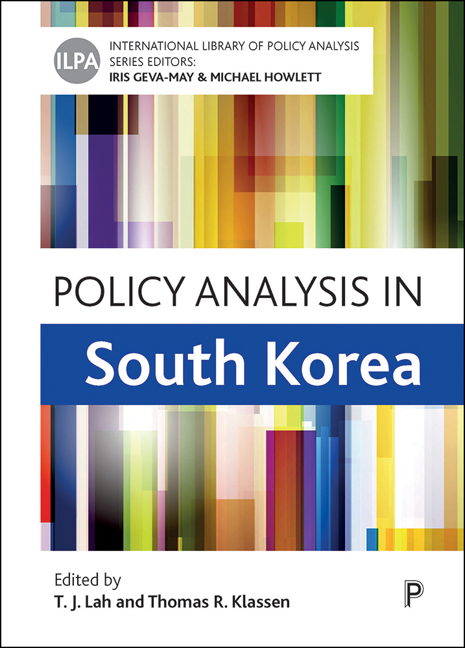Book contents
- Frontmatter
- Dedication
- Contents
- List of figures, tables and boxes
- List of abbreviations
- Notes on contributors
- Acknowledgements
- Editors’ introduction to the series
- Foreword
- Part One Overview of policy analysis in Korea
- Part Two Policy analysis by governments
- Part Three Committees, consultants, media, public inquiries and public opinion
- Part Four Parties, interest groups and advocacy-based policy analysis
- Part Five Academia, research institutes and policy analysis
- Index
five - Regulatory impact analysis: The experience of policy analysis in the Korean central government
Published online by Cambridge University Press: 18 January 2024
- Frontmatter
- Dedication
- Contents
- List of figures, tables and boxes
- List of abbreviations
- Notes on contributors
- Acknowledgements
- Editors’ introduction to the series
- Foreword
- Part One Overview of policy analysis in Korea
- Part Two Policy analysis by governments
- Part Three Committees, consultants, media, public inquiries and public opinion
- Part Four Parties, interest groups and advocacy-based policy analysis
- Part Five Academia, research institutes and policy analysis
- Index
Summary
Introduction
Policy analysis plays a crucial role in the policymaking process, contributing to rational decision making that makes public policy more efficient from policy formation all the way through to evaluation. The central government of Korea has been conscious of the importance of policy analysis since the 1960s, and first adopted policy analysis in 1967 alongside the Second Five-Year Economic Development Plan (1967– 71). The Economic Development Plan (EDP) was initially proposed based on the need for professional and systematic plans to tackle global economic challenges. The EDP was taken a step further through analysis and forecasts by participating foreign experts, ministries, financial institutions and other professionals under the supervision of the Economic Planning Board. However, the government-driven EDP ended in the late 1990s with the Asian financial crisis. Since then, a large chunk of analysis in the central government has given way to government-funded research institutes (Jung, 2002).
Korea has adopted numerous key policy analysis systems since the late 1970s. The Environmental Impact Assessment, which began in 1977, was aimed at achieving balance between development and conservation, pursuing eco-friendly sustainable development, and creating a healthy and pleasant environment (Ministry of Environment, 2016). The Traffic Impact Assessment of 1987 was brought in to analyse and predict the effects of traffic volume, flow and safety in order to minimise traffic problems. The regulatory impact analysis (RIA) was introduced in 1998 to improve regulatory quality and curb the creation of unreasonable regulations (The Office for Government Policy Coordination, OGPC et al, 2005). The preliminary feasibility study was initiated in 1999 to review the economic and technological feasibility of large-scale government projects, to ensure the objectivity of feasibility studies and improve the efficiency of financial investment.
Since the 2000s, the Gender Impact Assessment in 2002 was introduced to evaluate the socio-economic disparities between men and women in the process of establishing and implementing major policies in order to promote gender equality (Ministry of Gender Equality and Family, 2018). The Corruption Impact Assessment in 2005 was designed as an anticorruption policy by eliminating unclear laws and unrealistic regulations, promoting appropriate standards in the process of drafting and enacting laws, bringing greater transparency to administrative procedures and rationally analysing the causes of corruption (Anti-Corruption and Civil Rights Commission, 2017).
- Type
- Chapter
- Information
- Policy Analysis in South Korea , pp. 50 - 70Publisher: Bristol University PressPrint publication year: 2023



